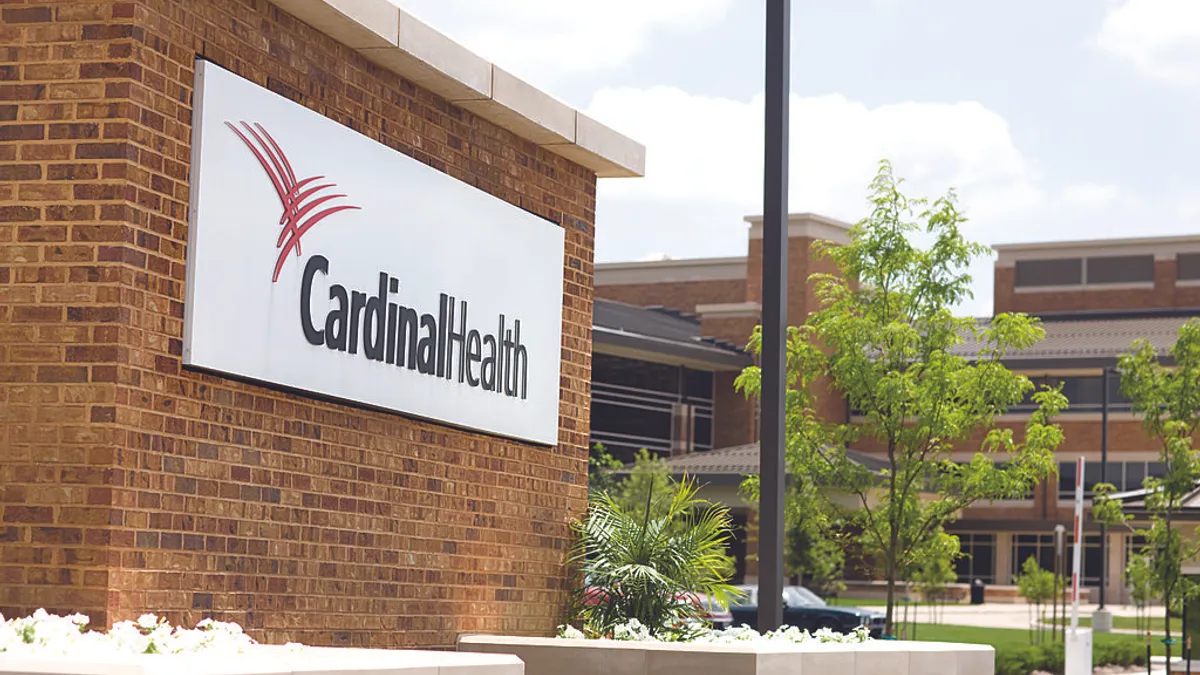Dive Brief:
- Medical supplies and drugs distributor Cardinal Health on Thursday reported a net gain in its fourth quarter, with overall revenue up 6% to $37.4 billion, compared with $35 billion a year earlier. The company has recently made management changes in an effort to goose growth.
- Cardinal's medical sector was still down in the quarter, with the profit margin falling from 2.92% in the fourth quarter of 2018 to 2.45% for the fourth quarter of this year. Quarterly revenue was $97 million compared to $114 million in 2018, a 15 percent drop.
- Cardinal CEO Mike Kaufmann told investors the company wasn't planning any M&A activity for the medical segment in 2020. The company is still dealing with the negative after-effects of its $1.9 billion acquisition of Cordis from Johnson & Johnson in 2015, including a legacy charge related to an exclusive distribution agreement with a Cordis supplier.
Dive Insight:
The Dublin, Ohio-based medical device and drug distribution giant is still struggling, posting disappointing results for its fourth quarter of 2019, with the medical segment of its business "below plan," Kaufman told investors.
Cardinal Health has been under a lot of pressure recently, under fire for its alleged participation in fueling the nationwide opioid epidemic and reorganization charges as it brought medical device manufacturer Cordis into the fold.
But Kaufmann told investors, "We feel incredibly good about the progress we're making with Cordis."
He said many of the challenges faced by the company's medical segment were "a little bit self-inflicted."
The company has recently shaken up its medical segment management team, tapping Stephen Mason to replace Jon Giacomin as CEO of the unit. Mason has spent the past few years heading up Cardinal’s at-home solutions business, a rare bright spot in the medical segment with multiple quarters of double-digit growth. The company is also searching for a new chief financial officer with current CFO Jorge Gomez set to step down shortly.
In a nod to the recent shakeups at the company, Kaufman said, "I have a ton of confidence in Steve."
Kaufmann said he expects the medical segment of the business to return to a more "normalized cadence" for the year. While medical segment fourth quarter revenue increased 1 percent to $4 billion due to growth from existing customers, medical segment profit decreased by 15 percent to $97 million in the fourth quarter.
"We have seen good underlying demand in the business," he added. "This year, we really expect the medical guidance to not be as back-end loaded as it has been in the past," he said.
Kaufman also touted $133 million in cost-cutting the company achieved as a positive, exceeding the $100 million the company was targeting for the year.
"I think there was some lumpiness in medical in 2019 that we don't expect in 2020," he said."We expect to see growth across all components of medical next year."
The company's guidance for fiscal 2020 includes an anticipated incremental $130 million in cost savings associated with actions intended to simplify the company’s operating model and cost structure, including potential changes to its manufacturing and distribution footprints.
Kaufmann also cited medical therapy, telepharmacy and the health messaging service as business bright spots, showing the increased connectivity among payers, pharmacies and patients. The company also said it renewed contracts with CVS and Kroger for a more than four year-period.
There are some additional negative forces ahead. In addition to facing potentially huge charges related to opioid litigation, Cardinal is also facing other negatives such as tariffs in the U.S. trade war with China and the possible implementation of the medical device tax that has yet to be repealed by Congress.











